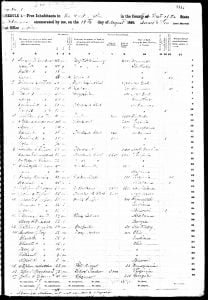1893 Ieshatubby Roll
This is a verified roll of Chickasaws registered by Ieshatubby in the Choctaw Nation under the act of June 20, 1893. The sheets are divided into columns for names, number of men, number of women, number of boys, number of girls, and totals. This roll does not indicate the amount paid or the recipients of the payments. It consists of two sheets of legal-cap paper; some names are written in ink, others in pencil. The word “paid” is generally written or indicated by ditto marks in the totals column. This roll was utilized by the Dawes Commission for enrollment purposes but was never indexed.



